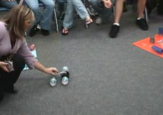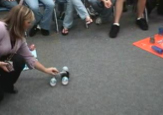Today we have several amazing videoconferences for our rural students in Berrien County.
EcoConversations
 Reed Middle School, in Bridgman, is connecting to a class in the UK to discuss environmental issues. The class in the UK shared with us information about carbon emissions, including some great posters and a RAP that started with:
Reed Middle School, in Bridgman, is connecting to a class in the UK to discuss environmental issues. The class in the UK shared with us information about carbon emissions, including some great posters and a RAP that started with:
hey hey, we’re here today, to tell our friends in the USA about CO2
Our students shared the issues around bottled water including health, media advertising, costs, public water supplies and more. After the thorough presentations, students asked each other questions about the weather, their school systems, uniforms. The students clearly enjoyed the interaction and learned from the other class.
Stand Up, Speak Out with MAGPI
 Lakeshore Middle School has been participating in a unique serving learning program with MAGPI. In the kick-off conference, students interviewed holocaust survivor, Gerda Weissmann Klein. As a follow-up, they participated in service learning projects and reported on the results on the project wiki. In today’s session the schools at each site are reflecting on their experiences with service learning and the impact of the program on their understanding.
Lakeshore Middle School has been participating in a unique serving learning program with MAGPI. In the kick-off conference, students interviewed holocaust survivor, Gerda Weissmann Klein. As a follow-up, they participated in service learning projects and reported on the results on the project wiki. In today’s session the schools at each site are reflecting on their experiences with service learning and the impact of the program on their understanding.
Talking to Students in Haiti with Global Nomads Group
Upton Middle School and St. Joseph High School are participating in the Global Nomads Group program with students in Haiti. You can read more about it here. The program was a two part connection, starting the conversation with the students in Haiti on Monday and continuing today. The participating classes are also raising money for Haiti through StudentsRebuild.org. You can see part of the action: watch  the live webcast on Friday, March 26 at 12:00 Eastern. More details on the GNG home page. These are incredibly powerful experiences, as students hear the stories of the students in Haiti, building empathy and understanding. We also were moved by the interaction of between Haitian students in Florida and the students in Haiti. GNG’s programs are always incredible!
the live webcast on Friday, March 26 at 12:00 Eastern. More details on the GNG home page. These are incredibly powerful experiences, as students hear the stories of the students in Haiti, building empathy and understanding. We also were moved by the interaction of between Haitian students in Florida and the students in Haiti. GNG’s programs are always incredible!
Seems like these VCs are a great way to celebrate this blog’s 5th anniversary! 5 Years since that first post!








